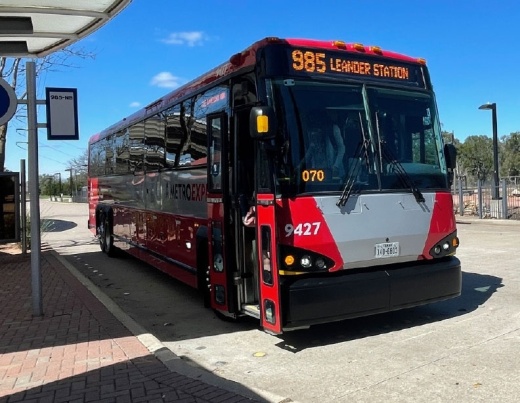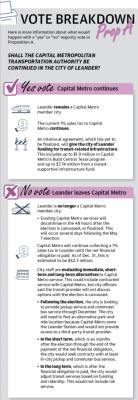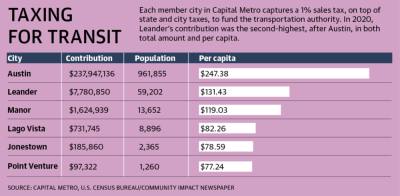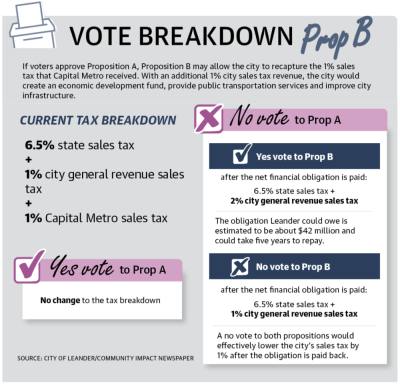Voters will be asked if the city should continue as a member city in Capital Metro, the regional public transit entity that serves much of the Greater Austin area. Voters elected to join Capital Metro in 1985 and confirmed that decision with another vote in 2000. For a second time, Leander residents will be asked if they want to remain in the Capital Metro partnership.
If a majority of voters say “yes” to staying in Capital Metro, bus, pickup and rail services will continue as normal. In addition, the two entities will move forward with an interlocal agreement that could provide the city with $1.9 million in funding to be used for certain local transportation projects under Capital Metro’s Build Central Texas and Transit Supported Infrastructure Fund programs.
In the agreement, Leander will receive a portion of Capital Metro’s new $10 million transit-supportive infrastructure fund. These funds will be shared by other small member cities and is proportional to sales tax contributions. Leander’s portion of the $10 million is estimated to be $7.74 million said Erika Mazza, the Capital Metro vice president of government affairs at a Jan. 24 board meeting. Capital Metro will also offer assistance to secure federal grants that support transit and assistive infrastructure, according to Capital Metro.
The terms of the interlocal agreement remain a work in progress by both entities, but Capital Metro, at its March 28 meeting, authorized its president and CEO to complete and finalize the agreement with Leander. The city similarly directed its staff to complete the agreement in January.
Leander Council Member Becki Ross, who also serves on the Capital Metro board, said the interlocal agreement makes sure the city is in a better financial position going forward. She added that she could have gone either way on the vote to call for the election to remain in Capital Metro. Ultimately, she voted against adding the Capital Metro proposition along with Esme Mattke Longoria in a 5-2 vote Jan. 25.
“This has been a lot of work over the last several months,” Ross said at Capital Metro’s March 28 meeting. “[I have] true appreciation for the Cap[ital] Metro staff and teams to make this [ILA] happen. It [was] a lot in a short period of time.”
Transit alternatives
If a majority of voters say “no” to staying in Capital Metro, bus, pickup and rail services would cease within 48 hours of canvassing votes, but the 1% sales tax would continue to pay down an outstanding balance estimated Dec. 31 to be about $42 million, according to council discussions and a Capital Metro spokesperson. That number is based on a previously agreed-upon formula that calculates assets and liabilities in case of a city’s withdrawal.
The city does not have confirmed alternatives in place as of press time, but city officials are in discussions with outside vendors for immediate, short-term and long-term transit options, city spokesperson Mike Neu said.
After the election, service would give transit access to those that currently use the services. The city is in discussions with four potential vendors for immediate service. The city solicited a bid for a next-day pickup service that could be completed in April.
In the shorter term of six months to four or five years, the city would solicit bids from alternative providers for contracts with at least in-city pickup and commuter bus services. In this second phase, there could be options for accessing The Domain and the Apple campus in Austin based on demand.
In the long term, the city would solicit new bids from alternative providers and may change transit services based on funding. This option would begin after the net financial obligation is paid and the city is able to recapture an additional 1% general sales tax.
The city is looking for an interim park-and-ride option as Capital Metro will not allow another vendor to use Leander Station, which Capital Metro owns, Neu said.
Leander resident Rachel Montemayor said it is concerning there are no set alternatives for current Capital Metro services. Montemayor’s husband, who is visually impaired, relies on the commuter rail to travel to Austin for work as a music teacher with Austin ISD.
“My husband could go on disability, but then this community and children lose out,” Montemayor said. “With Cap[ital] Metro, I know he has a safe and on-time ride to work, and, right now, there is no alternative for pickup service, MetroExpress or the MetroRail. And there is nothing in the works, just finding a bus that goes to Lakeline.”
According to Capital Metro, Leander could, following the election, negotiate contracted service with it should the city pull out.
Proposition B
A major reason why the council members, both past and present, have questioned the partnership is because of the high cost of service. Every participating city in Capital Metro collects a 1% sales tax to provide service. In 2021, the city of Leander collected $9.8 million for Capital Metro with that 1% sales tax, according to the state comptroller.
Contingent on the fate of Proposition A, Proposition B will ask voters to reallocate the 1% sales tax that Capital Metro receives back to the city once the net financial obligation with the transit authority is fulfilled. Payback of that $42 million obligation could take four or five years, according to the city.
The ballot item will ask voters to approve a 2% general revenue sales tax, but this will not increase the current 8.25% sales tax rate in the city. The city already receives a 1% general revenue sales tax, so voter approval would reallocate the 1% sales tax to the city and create a total 2% general revenue sales tax.
Council members unanimously signed a resolution March 3 that specifies how the city would use the additional 1% general revenue sales tax. This includes creating a dedicated economic development fund, providing public transportation services and expanding and enhancing critical city infrastructure.









